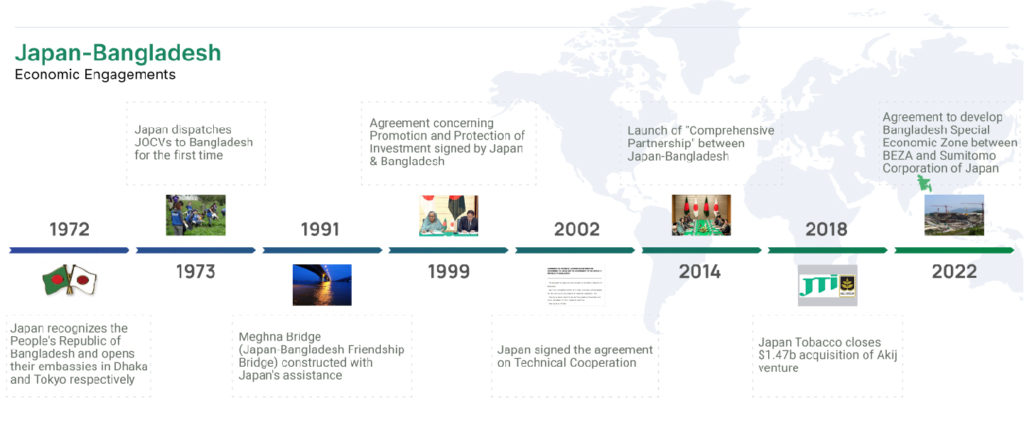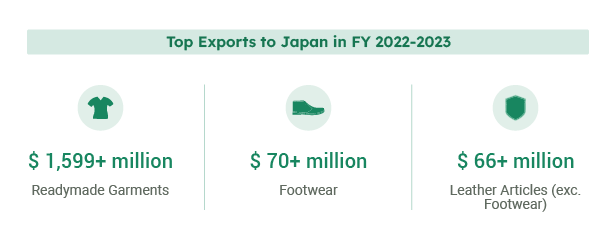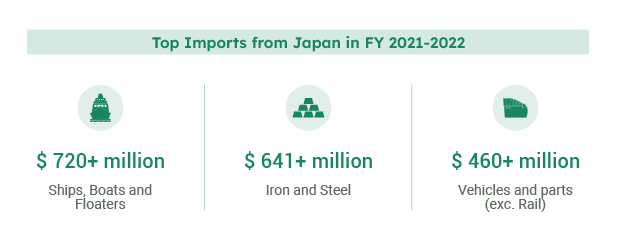Japan is the largest bilateral development partner of Bangladesh. The relationship between Bangladesh and Japan has evolved significantly since Japan recognized the People’s Republic of Bangladesh on February 10th, 1972, shortly after its independence. Both nations have actively engaged in diplomatic initiatives and collaborations to foster mutual understanding and cooperation. The opening of embassies in Dhaka and Tokyo in 1972 marked a pivotal step in cementing their diplomatic ties. Furthermore, agreements concerning international money orders, air services, taxation, investment, and technical cooperation have served as foundational elements of their relationship.

Japan’s investment in Bangladesh has played a significant role in strengthening economic ties between the two countries. Making Japanese investors one of the largest in the country. In 2022, Bangladesh received a net FDI inflow of $102.77 million, representing 2.95% of the total FDI inflow for that year. As of December 2022, the cumulative FDI stock reached $675.7 million. Fertilizer ($69.6 MN) Gas & Petroleum ($4.7 MN), and Textile & Weaving ($3.1 MN) have emerged as the top sectors in terms of gross FDI inflow from Japan. The maiden deep seaport of Bangladesh in Matarbari is being partly financed by Japanese loans amounting to nearly USD 1.27 billions.

Trade statistics illustrate the dynamic economic collaboration between Japan and Bangladesh. During July ‘22–June ‘23, Bangladesh’s export receipts from Japan amounted to 1.9 Billion USD. Top exported items to Japan included Readymade Garments, Footwear, Leather Products, and Home Textiles.

On the import front, Bangladesh’s payments to Japan for FY 21-22 totaled around $2.4 billion. Key imports encompassed Ships, boats, and floaters; Iron and steel; vehicles and parts thereof (excluding rail), and Nuclear Equipment. Bilateral trade relationships hold further promise as Japan’s Indo-Pacific strategy encompasses Bangladesh as a strategic partner.

The relationship between Bangladesh and Japan is fortified by several agreements, including the Agreement on Technical Cooperation signed in 2002. Additionally, the Convention for the Avoidance of Double Taxation and the Prevention of Fiscal Evasion with respect to Taxes on Income and the Agreement concerning the Promotion and Protection of Investment highlight the mutual commitment to facilitating cooperation in various sectors. Policies such as the Comprehensive Economic Partnership Agreement (CEPA) and Japan’s provision of a Generalized System of Preferences (GSP) have facilitated bilateral trade and economic cooperation.
To further promote investment, a Japanese Economic Zone is being constructed in Araihazar, Narayanganj, with completion expected by 2030. Companies operating in the economic zone will enjoy tax exemptions, income tax immunity on 50 percent of export earnings, duty-free exports, cash incentives, bonded warehousing facilities, and duty drawbacks.
Contact us for a comprehensive understanding of the investment landscape in Bangladesh